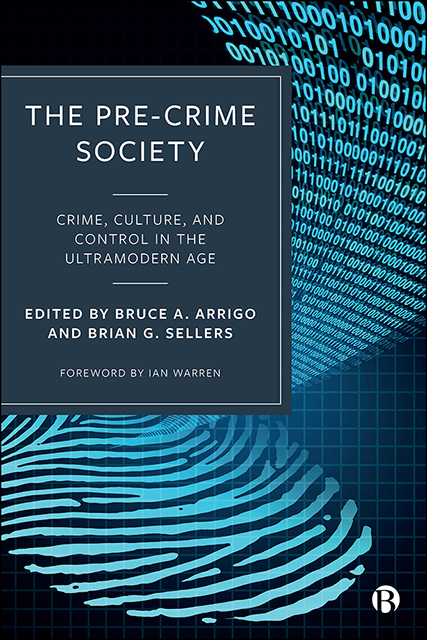Book contents
- Frontmatter
- Dedication
- Contents
- Notes on Contributors
- Foreword
- Introduction: The Ultramodern Age of Criminology, Control Societies and ‘Dividual’ Justice Policy
- Part I Theories, Theorists and Theoretical Perspectives
- Part II Institutions, Organizations and the Surveillance Industrial Complex
- Part III Dataveillance, Governance and Policing Control Societies
- Part IV Systems of Surveillance, Discipline and the New Penology
- Part V Globalizing Surveillance, Human Rights and (In)Security
- Afterword: ‘Pre-Crime’ Technologies and the Myth of Race Neutrality
- Index
20 - Global Surveillance: The Emerging Role of Radio Frequency Identification (RFID) Technology
Published online by Cambridge University Press: 14 April 2023
- Frontmatter
- Dedication
- Contents
- Notes on Contributors
- Foreword
- Introduction: The Ultramodern Age of Criminology, Control Societies and ‘Dividual’ Justice Policy
- Part I Theories, Theorists and Theoretical Perspectives
- Part II Institutions, Organizations and the Surveillance Industrial Complex
- Part III Dataveillance, Governance and Policing Control Societies
- Part IV Systems of Surveillance, Discipline and the New Penology
- Part V Globalizing Surveillance, Human Rights and (In)Security
- Afterword: ‘Pre-Crime’ Technologies and the Myth of Race Neutrality
- Index
Summary
Introduction
We are seeing changing patterns of governance in a globalizing world. Globalization initially gestured at interconnectedness, with others involved in our lives as we in theirs—it was envisioned as a metaphor for the ‘Global Village’ (McLuhan, 1964). Yet, globalization was reconstructed through the lens of global neoliberal capitalism, which is governed by market logics, technologies and homogenizing modes of human interaction that often produce marginalizing and dehumanizing processes geared toward control (Bauman, 1998). In our ultramodern era, crime is also reassembled so that the criminal and the vulnerable are linked to danger and surveillance, justifying new ventures in securitization policy and practice. The responsibilization of citizens globally through devices of post-panoptic bio-power require researchers in the post-criminology era of pre-crime to reexamine the matters of identity-making and rights-claiming as they relate to the concept of citizenship by critically re-problematizing this static construction of the social person (Sellers & Arrigo, 2016).
Global neoliberal capitalism seeks to weather its own crises and creatively consume its contradictions while imposing uniformity—that is sameness in the sense of the same everywhere (Noys, 2011). A closer examination of the biopolitical processes, technologies of domination and multiplicity of surveillance accompanying neoliberalism is needed to expose techno-globalism's mechanisms of post-panoptic (synoptic) and banoptic control. This new ultramodern sign-optic system of governmentality does not refer only to the management of political structures but also designates the way in which the conduct of individuals or groups might be directed (Foucault, 2008). The resulting neoliberal governance recognizes the need to make subjects more governable and interactively visible to prevent and pre-empt deviance or crime so securitization efforts can be normalized. Instruments of bio-digital power, such as radio frequency identification (RFID) implants, impose the liquid process of individualization, which places the focus onto individual personal responsibility for social or economic failure, delinquency, crime or violence (Bauman, 2000). The conditions required for creating newly responsibilized global citizens includes: (1) technologies of surveillance, which act as biopower—instruments of technology deployed to discipline and make individuals behave; (2) heightened individualism fostered through competition and linked to fear of cultural and economic non-survival; and (3) discourse of moral absolutism tied to inevitability of the economization of the Social—suggesting no alternatives to neoliberal forms of marketization, choice and competition exist (Sellers & Arrigo, 2017, 2018a).
- Type
- Chapter
- Information
- The Pre-Crime SocietyCrime, Culture and Control in the Ultramodern Age, pp. 455 - 482Publisher: Bristol University PressPrint publication year: 2021

